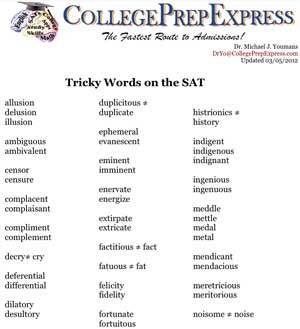 One of the three bodies of material covered on the SAT is vocabulary. It’s a substantial body of material, to be sure, but since the days of the Princeton Review’s Hit Parade and other lists culled from ACTUAL, PUBLISHED SATs, at least the CollegeBoard’s word bank isn’t a mystery any more. Any real student of the test can discover what words are on the exam, and those words can be systematically studied in preparation. At CollegePrepExpress, for example, we give students access to all the challenging vocabulary, Critical Reading section by Critical Reading Section in the CollegeBoard’s Official Guide to the SAT, in ready-made lists on Quizlet.com. (If you’re interested in having access to them, visit our Downloads section.)
One of the three bodies of material covered on the SAT is vocabulary. It’s a substantial body of material, to be sure, but since the days of the Princeton Review’s Hit Parade and other lists culled from ACTUAL, PUBLISHED SATs, at least the CollegeBoard’s word bank isn’t a mystery any more. Any real student of the test can discover what words are on the exam, and those words can be systematically studied in preparation. At CollegePrepExpress, for example, we give students access to all the challenging vocabulary, Critical Reading section by Critical Reading Section in the CollegeBoard’s Official Guide to the SAT, in ready-made lists on Quizlet.com. (If you’re interested in having access to them, visit our Downloads section.)
With the SATs coming up again this weekend, we thought now would be a good time to remind students that while the meanings of words can often be derived from knowledge of prefixes, roots, and suffixes, the CollegeBoard loves using words that do NOT mean what you think they should. Here are 10 of our favorites, culled from CPE’s copyrighted document, “Tricky Words on the SAT”:
- AMBIVALENT: This word does NOT mean the same thing as its much more common cousin, AMBIGUOUS, which mean unclear or open to more than one interpretation. The word ambiguous is almost always reserved for negative contexts, as in, the students were understandably upset by the teacher’s ambiguous directions, leaving them unsure about how to respond to the test question. The word AMBIVALENT, by contrast, means having mixed feeling about, as in, because her heart told her one thing but her head another, she felt ambivalent toward her boyfriend.
- DISCRETE: This word does NOT mean the same thing as its more common cousin, DISCREET, which means tactful or careful so as not to hurt someone’s feelings. Be discreet at the party and don’t bring up the impending divorce, your parents might tell you. DISCRETE, on the other hand, simply means separate and distinct. Here’s a great mnemonic to remember it: In the same way you may remember the correct spelling of SEPARATE because the “R” SEPARATES the two “A’s,” remember that when DISCRETE means separate, the “T” SEPARATES two “E’s”!
- ENERVATE: This word sounds like it means to ENERGIZE, but it actually means the exact opposite, to sap the energy from. After the long hike up the steep mountain, we felt ENERVATED, and had to stop for a substantial rest.
- FACTITIOUS: This word looks like it has something to do with FACTs, but, again, it’s almost the exact opposite. FACTITIOUS means artificially created or developed, as in the factitious friendliness shown by the beauty-pageant contestants to one another.
- HISTRIONICS: Everyone who sees this word is tempted to think it has something to do with HISTORY. It doesn’t. Notice there’s no “O” between the “T” and “R” in HISTRIONICS, which means theatrical or overly dramatic. Stop waving your arms, spare us the frothy emotional appeals—in fact, cut the HISTRIONICS entirely—and calmly tell us what happened.
- MERETRICIOUS: Many students think at first sight this word has to do with MERIT, which the word MERITORIOUS does (as in, worthy of merit). Note, though, that MERETRICIOUS begins with MERET not MERIT. MERETRIOUS means, once again, almost the opposite of MERITORIOUS, apparently attractive but having in reality no value or integrity: The MERETRICIOUS beauty of the prostitute was achieved only through the application of copious amounts of make-up and slinky apparel.
- NOISOME: Everyone is tempted to think this word has something to do with NOISE or being loud. Oops. Nothing to do with volume whatsoever. NOISOME means rotten, spoiled, rancid, or stinky as a result of being any of the above. Back in 1981, my SAT tutor taught me this word by drawing a figure of a girl with stink waves rising up over her, and the caption read, NOISOME Nellie is always smelly. (Hey don’t laugh, it worked ;-)).
- RECAPITULATE: If you know that CAPITULATE means to surrender (as in General Lee CAPITULATED to General Grant to end the Civil War) and you know that “RE” means to do again, then you might well think that RECAPITULATE means to surrender again. Of course, it doesn’t. It actually is the long form of the common abbreviation used on news and sports casts, as in the phrase, to recap our major stories. Hence, RECAPITULATE means to summarize.
- REPROVE: Again with the tricky “RE” words. This doesn’t mean to prove a second or third time, which you’d have good reason to believe it does. REPROVE actually means to scold, chide, chastise, castigate, admonish, reproach, reprimand, or censure (didn’t mean to show off there, but ALL THESE WORDS ARE ON THE SAT!) The student was REPROVED for his use of obscenity in the classroom.
- TORTUOUSI This word does not mean the same thing as its cousin, TORTUROUS, which means painful, as in full of torture. Note there is no “R” in TORTUOUS, which means full of twists and turns, both literally and figuratively: We followed a scenic route that was both remote and TORTUOUS, and the professor’s explanation was so TORTUOUS that it left us more confused than when we started.
